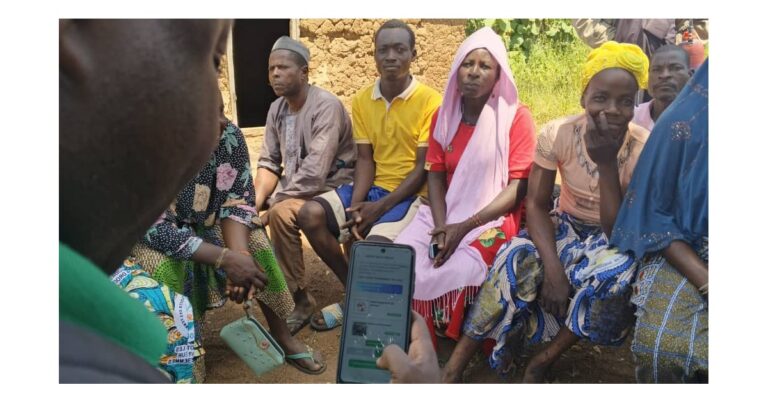The Sahel area is among the poorest and most vulnerable, facing conflict and displacement risks. These risks are spilling into neighboring Gulf of Guinea countries that share similar challenges.
In this context, community and local development (CLD) can offer a practical approach for reaching vulnerable communities with basic services driven by their own self-identified priorities and needs.
However, implementing a CLD approach in FCV settings is not without challenges such as social tensions, hard-to-reach locations and elite capture. This is where digital innovation can help. As smartphones, connectivity, and cloud technologies expand into these places, digital tools fill critical gaps to enhance participation, inclusion, transparency, and accountability.
Community-driven development App
To this end, in 2023, the State and Peacebuilding Fund (SPF) provided grant funding to develop and launch a CDD app. This digital tool helps communities get more involved in planning and making decisions about development projects that affect them.
Community facilitators, recruited locally, use the app to help villages identify needs and manage project funds. The app guides facilitators step-by-step through the project cycle and enables them to track progress, uploading data to a local development portal. This portal allows governments and partners to see which priorities need funding, helping them allocate resources efficiently and avoid repeating consultations.
This grant has shown that a small but catalytic investment of US$400,000 from SPF in low-cost, open-source, and accessible digital tool has generated significant results. The grant has transformed the nature of CLD operations in FCV settings by delivering impact beyond the grant activities and supporting prevention efforts at the community level.
Impact so far
As an open-source tool, the CDD app can be customized to fit different planning and investment cycles across different countries and projects. So far, it has been used in over 2,500 villages across the Sahel and Gulf of Guinea, helping communities identify more than 7,500 projects they want to tackle. The World Bank’s International Development Association (IDA) has funded about 3,000 of these projects. For example, the Gulf of Guinea Northern Regions Social Cohesion project is helping border communities that face both conflict and climate risks work together to address them. By September 2025, this project had built or renovated over 1,500 climate-resilient structures, like water systems, schools, and health clinics. It has created more than 96,000 new jobs and improved access to services.
But the impact goes beyond numbers. In places like the Sahel, communities that have been divided, like farmers and herders, have been encouraged to come together to solve problems they all face. Similarly, in Togo and Benin, 96 percent and 91 percent respectively of people who benefited from the social cohesion project reported that the project contributed to increased trust among community members. This lessens community tensions that extremist groups may exploit. Young people also earn income through short-term public works and local projects they help initiate. That makes them less vulnerable for extremist groups to recruit. And perception of government is improving as local communities control how resources provided by the government are invested to improve their wellbeing.
Partnerships are important
Partnerships with client governments, local communities, UN agencies, NGOs, and bilateral partners have contributed to the relevance and sustainability of the tools. Development partners, such as the World Food Programme, are using the community-identified priorities on the CDD app to guide their programming and improve collaboration. In Togo, the local development portal has become a key tool for coordinating partner investments to align with community priorities.
Scaling up for greater impact
The success of the app and platform demonstrates the potential of digital tools in FCV contexts. These tools can be scaled and replicated through more World Bank projects that will apply a CLD approach and are focused on prevention or stabilization and recovery. The CDD app was initially deployed in Togo, Benin and Mali. The government of Guinea has expressed interest in the app as well. Also, there is a growing demand from other countries, including Burkina Faso, Cameroon, Mauritania, Niger, Papua New Guinea, and Senegal.
Community facilitators participate in training on the CDD App in Mango, Togo. Photo Credit: Central Operational Support Office Project Implementation Unit.
Innovative and catalytic solutions to support the new FCV strategy
As the World Bank develops a new five-year FCV strategy, SPF will continue to be a vehicle for supporting innovation and solutions in new and frontier areas. SPF’s 2024 Annual Report highlights its ongoing impact. It also reflects on SPF’s legacy since 2008, including its ability to incubate and advance new approaches to provide demonstration effect to mobilize additional resources for scale and impact. The efforts are laying the groundwork for solutions that will help us deliver more effectively in FCV contexts. By empowering local actors, enhancing transparency, and fostering collaboration, we are building the foundations for more resilient, inclusive, and peaceful societies.
Images are for reference only.Images and contents gathered automatic from google or 3rd party sources.All rights on the images and contents are with their legal original owners.

